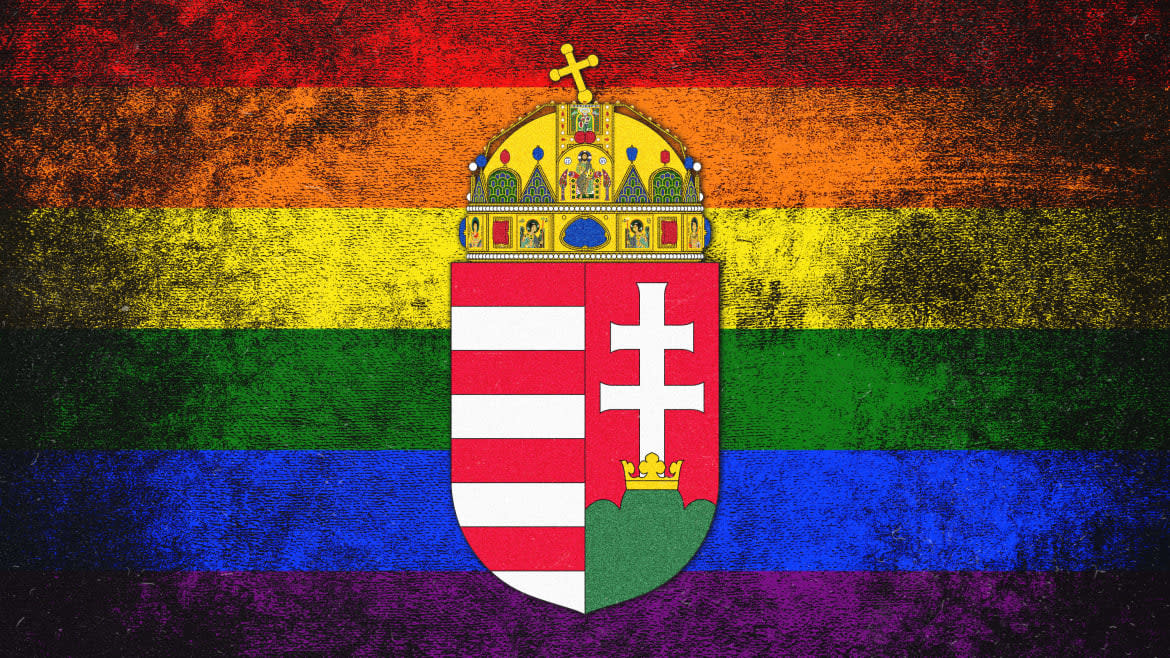This European Country Could Be the Next Anti-LGBTQ Hell Zone

- Oops!Something went wrong.Please try again later.
- Oops!Something went wrong.Please try again later.
As Russia’s bloody invasion devastates neighboring Ukraine and refugees flood into Hungary, the gay community in Budapest is fighting the increasingly repressive policies of its far-right Fidesz government. Prime Minister Viktor Orbán, until recently an avid supporter of Vladimir Putin, has been in charge in Hungary since 2010. Like Putin, he introduced several laws that intensified the pressure on the LGBT+ community and considers homosexuality incompatible with Christian values. In the upcoming elections on April 3, Orbán’s Fidesz party has a good chance of being reelected.
“Orbán’s policy in the last 12 years has always been to pick a target and then start to shoot,” Anna Szlavi, co-founder of the Qlit network, an organization and website for gay women in Hungary, told The Daily Beast. She’s sitting with her American life-partner Amy Soto at the Why Not Cafe, a gay-friendly haven on the banks of the river Danube in Budapest. “In 2021 the so-called ‘pedophile law’ was introduced, which basically kind of conflated the LGBT+ [community] with pedophiles,” Szlavi says. “Orbán repeatedly upholds this idea that [being] LGBT is an abnormal thing and it’s OK to equate them with pedophiles.”
Tucker Carlson’s Orban Lovefest Is a Dark Glimpse of the Future MAGA Wants
The new law, which formalizes the censorship of information about LGBT+ people, is the latest step in a series of legal clampdowns on the civil rights of the country’s queer community. It essentially outlaws all content that portrays non-heterosexual relationships for people up to the age of 18. Because of it, educational programs in schools, support websites or informational channels about the LGBT+ community are now banned. Even children’s books with references to gay couples are forcibly hidden away in bookstores.
Case in point: the children’s book A Fairytale for Everyone, published by the lesbian and bisexual organization Labrisz. “The book contains stories of diversity, not just LGBT+ stories. It’s also about homelessness and about ethnic issues,” Szlavi says.
It takes a highly motivated buyer to track down the book under the current legal constraints. In a branch of the Libri bookstore chain located in a shopping mall just outside the center of Budapest, finding A Fairytale for Everyone feels like taking a step into illegality. Firstly, an employee is likely to misunderstand what you are looking for, sending you straight to books on fairytales. But that’s not where it can be found. It’s tucked away behind stacks of other books, untraceable to anyone not familiar with the inner workings of the store.

Russian President Vladimir Putin shakes hands with Hungary's Prime Minister Viktor Orban during their meeting at the Kremlin in Moscow on July 15, 2018.
The so-called pedophile law is just the latest administrative step signaling a much wider policy to ensnare and marginalize minorities in the country, says Amnesty International’s Hungary director Aron Demeter. Hungary has all sorts of policies in place to protect certain groups and is disenfranchising others. Orbán, says Demeter, “is protecting children and families and the ‘old traditional Europe’ as our prime minister likes to call it, which is basically a very traditional, very white, Hungarian community.” It affects refugees, asylum seekers and immigrants, as well as members of the LGBT+ community. For them, it means that the “same rights like equal marriage, adoption and basically any kind of appearance in public life,” are now out of the question, Demeter says.
Supporters of the Fidesz government appear to have no problem with the new legislation. There is a substantial part of the Hungarian population that feels the clampdown on the gay community is for the best. Registered city guide Feri thinks the new laws are a good thing. It protects children from the propaganda by members of the LGBT+ community, he believes. “It’s only a rule against the propaganda from the LGBTQ; to prevent them from spreading their pedophile propaganda in daycare centers and primary schools. I've seen films about it,” Feri assures, “It’s really happening.”
Feri argues the law is there to protect the kids. “After they turn 18, they can choose to be gay.” To him, there is no point in arguing the lack of choice in the matter, because according to Hungary’s leading party, homosexuality does not exist, and is therefore a matter of personal choice.
Budapest was built along two sides of the Danube River and a number of bridges have united the western bank of Buda with the eastern side of Pest since 1873. Its center is filled with monumental city blocks and huge neoclassical government buildings. They were built to impress, and maybe to intimidate a little as well. Grey and towering, they look like fortifications. The Hungarian parliament buildings seem ancient, but were in fact built in the early 20th century. Most buildings in Budapest are no older. They are a testament to the bloody past of Hungary, a country that has been invaded and destroyed many times.
It’s why the statues of former invaders are still neatly stacked in Budapest’s cellars, city guide Feri tells its visitors. Giant bronze statues of Stalin and Lenin are all kept in one place. “After all,” Feri says, “You never know. The Russians may be back. Hungarians are always prepared for anything. And now the Russians have invaded their neighbors.”
But what Feri fears just as much is the alleged threat from within—what he calls, “the demographic problem.” For Ukrainian refugees with a similar religious and ethnic background, Hungary’s doors are often swung wide open, but for the ‘other kind’ of refugees, they remain firmly shut. “We are doing very well in the last 12 years since Orbán has been in power,” Feri says. “He has built a fence to keep the immigrants out, and we are paying for that ourselves.”

Demonstrators march on Liberty Bridge during the annual Pride parade in Budapest, Hungary, on Saturday, July 24, 2021.
The fence is not the only way Orbán is trying to safeguard his idea of what he thinks the Hungarian population should look like. Feri has three kids, and that’s no coincidence. “People with three kids get a lot of money from the government,” Feri explains. “With every kid you get extra money.” Life without this government grant is difficult, the guide says. “But with the money for children you are well off. It’s Orbán’s way to make sure Hungary stays Hungarian.” Forging a society based on certain characteristics and ethnicities and excluding others, is often referred to as “the solution to the demographic problem.” It’s a dog whistle for a far-right agenda with ideals for a society in which people like Szlavi and Soto have no place.
Szlavi and Soto say they don’t want children. But if they did, a normal family life would be out of the question, because Hungary has outlawed in-vitro fertilization for lesbian and gay couples, and single parents can’t adopt here. It forces gay couples to make difficult decisions; not to have children at all, or taking the risk of having a child illegally, with a willing sperm donor. “I guess back in the States you would call it the ‘Turkey baster method,’ basically IVF, but at home,” Soto says. However, the non-biological parent in Hungary has no rights to the child.
In 2020, Hungary passed a new law against trans people, which solely determines sex based on chromosomes and prevents people from changing their birth name. “I have a lot of trans friends.” Soto says. “Many have left the country since the new laws. They were fortunate enough to have jobs and education where they could get jobs abroad. Others are saving money. As far as I hear from the trans community, they don’t see any future here. For the lesbian community, well, if you want any kind of family, you are gonna have to do something illegal to make it happen.”
Like in Hungary, a record number of anti-LGBT+ legislation has swept different U.S. states in recent years. Most recently, Florida adopted a law uncannily similar to Hungary’s so-called ‘pedophile law.’ Defending the law, nicknamed the ‘Don’t Say Gay’ law, Governor Ron Desantis echoed the same arguments Fidesz often uses, saying: “For grades pre-K through [grade] three. And we’re gonna make sure that parents are able to send their kids to kindergarten, without having some of this stuff injected into their school curriculum.”
Florida’s ‘Don’t Say Gay’ Bill Is as Vicious as It Sounds
Meanwhile in Texas, Governor Greg Abbott equates gender affirming support for trans teens with child abuse.
Since the new laws were passed in Hungary, hate incidents and crimes have been on the rise. “One of our close partner organizations, Hatter, has a hotline for hate incident victims and they report an increased level of incoming calls,” Demeter says. “Our working theory is that the law made it ‘OK’ to be violently homophobic and transphobic, so to some extent it might encourage extremists to, for example, go beat up same-sex couples.”
The rights of LGBT+ people will be on the ballot in Hungary’s upcoming election and referendum.
“Do you agree with the following statement: Gender re-assignment surgeries should be promoted among children going to kindergarten?” That is one of the four questions asked in a referendum added to the upcoming electoral ballot on April 3. “This is the level of insanity we’re dealing with,” Demeter says. “Amnesty’s position is that because these are invalid questions, the vote is invalid, and comes at a terrible expense of the LGBT community.”
It will not be easy to pull back the changes made by the current government, even if Orbán loses the election. “We now have a system which lacks most of the independent institutions that could control executive power,” Demeter says. Orbán strategically placed Fidesz loyalists in key positions within major governmental institutions. Those civil servants will keep protecting what Orbán created. “Which also means that whatever they want to do to human rights, they can, because there is no one, no institution powerful enough, to stop them,” Demeter says.
Get the Daily Beast's biggest scoops and scandals delivered right to your inbox. Sign up now.
Stay informed and gain unlimited access to the Daily Beast's unmatched reporting. Subscribe now.

